Heatwave: Wildfires spread across Europe
- Published
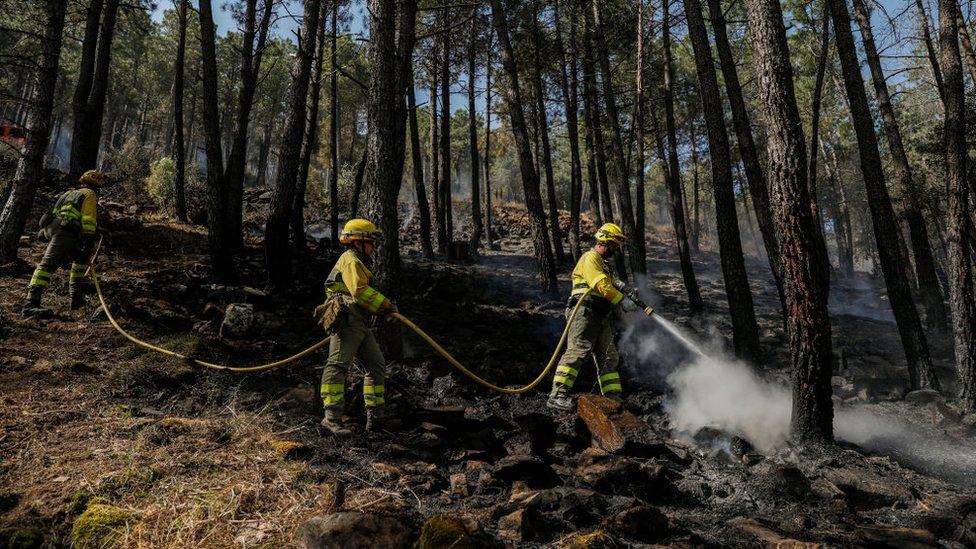
Wildfires across Europe have led to more than 1,000 deaths, and forced tens of thousands to flee their homes
Wildfires are burning across Europe fuelled by the hot conditions.
In Western France, thousands have fled their homes as firefighters tackle spreading blazes. In Spain, at least 20 fires are burning out of control. Meanwhile, thousands of hectares of land have also been burned in Greece and Portugal in recent days.
Our correspondents across the region have been describing the situation on the ground:

Endless pockets of fire
Jessica Parker reporting from La-Teste-de-Buch, France
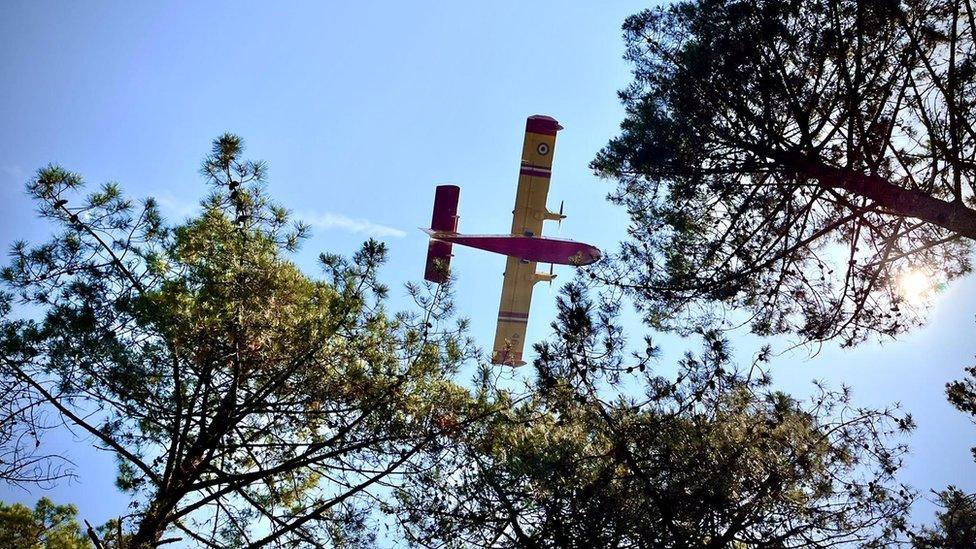
A Canadair "water bomber" was dropping water on the forest in La-Teste-de-Buch, Gironde, France
We joined a convoy of journalists escorted into woodland in the direction of the coast where campsites were abandoned by holidaymakers days ago.
At first you could see clouds of smoke hanging in the woods but it all seemed relatively under control.
But, the further in we went, the worse it got.
Suddenly there were endless pockets of fire on the side of the road. Trees were burning. Firefighters along the route were endlessly trying to tackle the most serious hot spots.
They are trying to prevent the blaze spreading across the road. It is hot work in smoky conditions.
As we got closer to the shore, suddenly there was a roar above our heads. It was a Canadair aircraft - a "water bomber".
Six of them have been deployed to the area to help put out the flames. It seemed like four or five passed over our heads, one releasing a huge burst of water on the ground below.


'It's painful to see the countryside burn'
Guy Hedgecoe reporting from Madrid, Spain
The body of a shepherd was found in the Sierra de la Culebra, in the north-western province of Zamora, where a fire has been blazing since the weekend. The fire service said that the man had not heeded instructions to local people to remain in their homes. He is the second fatal casualty of the Zamora fire after a 62-year-old firefighter was killed on Sunday.
Manuel García, a local livestock farmer, knew the fireman who died and he has watched as the fire has spread. His son, Unai, told Spanish media that, despite the danger and likelihood they would have to evacuate, he wanted to stay because of the sheep, goats and cows they have. "In a wildfire the worst professions to have are those of firefighter and farmer," he said.
On Monday morning, the high speed rail link between Madrid and the north-western region of Galicia was suspended due to the fire's spread onto the route near Zamora.
Eight villages in the area had been evacuated by this morning, with more evacuations expected throughout the day. Evacuees are being taken to public buildings and care homes in the city of Zamora.
"It's painful to see the countryside burn, it's painful to see homes burn, but right now the priority is to save the lives of the local people affected," said Clara San Damián, of the local government.
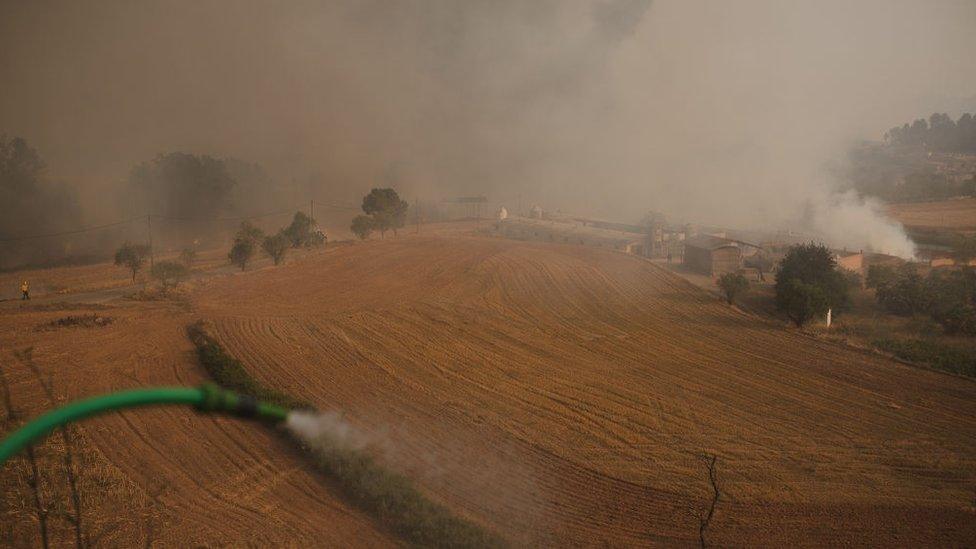
On Sunday, fires near Barcelona, Spain, spread uncontrollably, devastating farmland
A fire has been spreading in the north-eastern region of Catalonia, where it came right up to the house of Mercedes Pino, near Pont de Vilomara.
"I was in bed and through the window I saw a very red light," she said. "I ran as fast as I could to the door and I saw a flame burning a caravan we have in front of the door." She and her husband spent two hours trying to extinguish the flames before being evacuated.
In Pont de Vilomara, the local police are planning to accompany evacuees who own pets back to their homes, if safe, in order to feed the animals.

State of alert remains in place in Portugal
Alison Roberts reporting from Lisbon, Portugal
In Portugal, temperatures have dropped somewhat but the tinder-dry conditions remain that have seen more than 40,000 hectares of forest go up in flames so far this year.
According to the national meteorological office, IPMA, one third of mainland Portugal is at extreme fire risk, one third at very high risk, and at almost all at high risk, due to severe or extreme drought conditions virtually everywhere.
Just after noon on Monday, there were more than 1,400 firefighters in action at 44 fires, eight of which were deemed active.
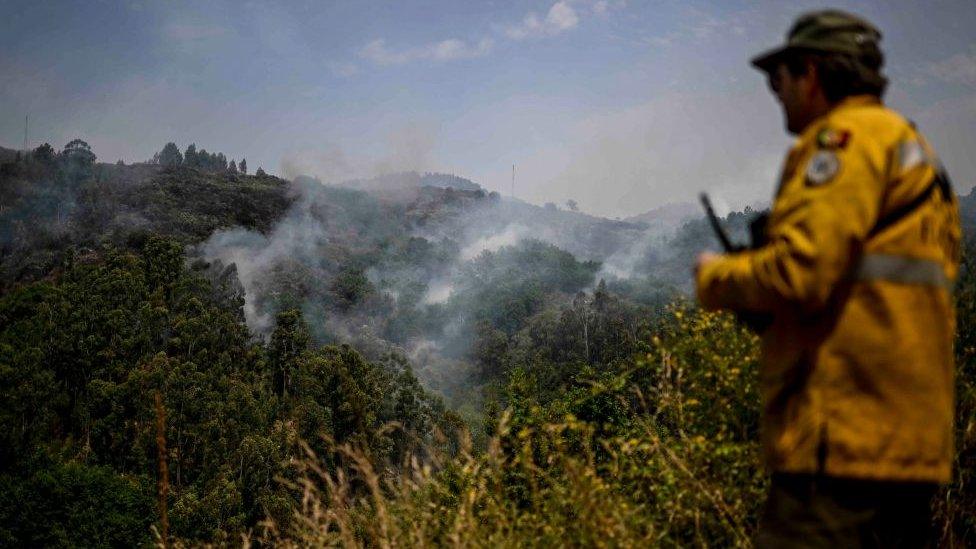
Portugal's ministry of health estimates that 659 people have died due to the heatwave
A state of alert remains in place, meaning continued restrictions on access to activities permitted in forested areas, with the government to review the situation on Tuesday.
After the terrible trauma of the June 2017 fires, which claimed at least 66 lives, the absolute priority of emergency and civil defence commanders has been to act early to protect life. Between 8 July and Saturday, 869 people were evacuated from their homes, in areas from the far north to the Algarve, in the south.
Meanwhile, the Ministry of Health estimates that at least 659 people died last week due to the heatwave, most of them elderly.
Related topics
- Published18 July 2022
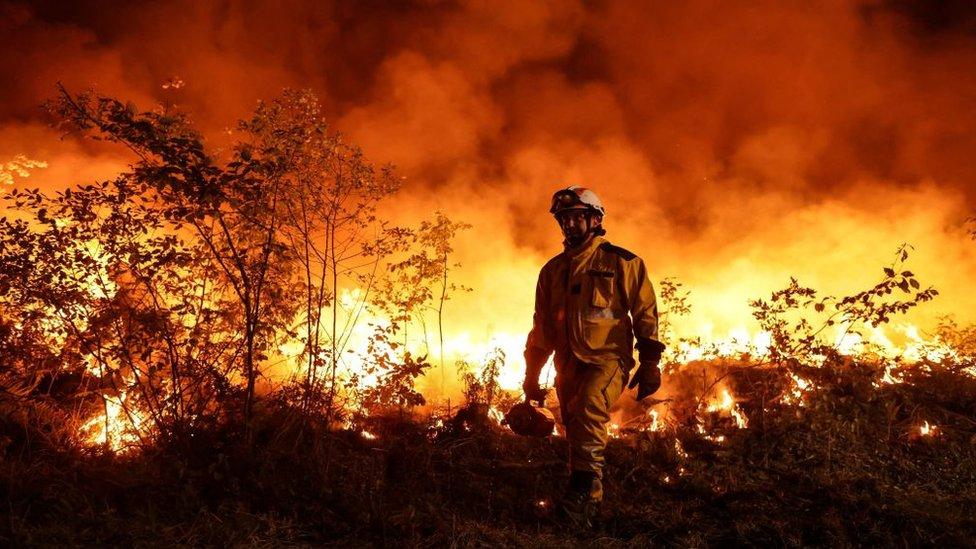
- Published19 July 2022
